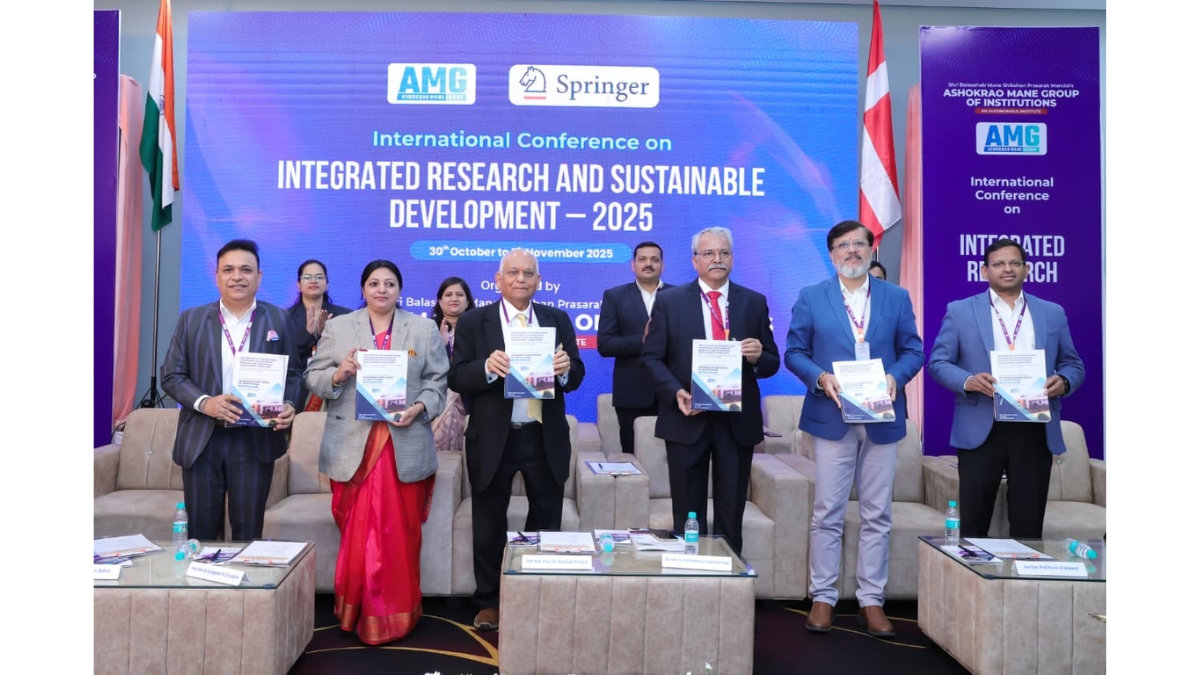International Conference and Workshop Inaugurated at Ashokrao Mane Group of Institutions
Kolhapur (Maharashtra) [India], November 4: “Youth must recognize the direction of this rapidly changing technological era and start preparing themselves accordingly. The focus should be on research, innovation, and experimentation — this is the need of the hour. India must take the lead in the field of 6G technology, and young researchers should align their careers toward this emerging domain. If the energy, creativity, and technical skills of our youth are channeled in the right direction, India can lead the global 6G revolution,� said Prof. Dr. Ramjee Prasad, Founder-President, CTIF Global Capsule.
He was speaking at the inauguration of a three-day International Conference on Research and Sustainable Development organized by Ashokrao Mane Group of Institutions, under the Shri Balasaheb Mane Shikshan Prasarak Mandal’s Ashokrao Mane Group of Institutions (An Autonomous Institute), at Vathar Tarf Vadgaon, Kolhapur.
The conference witnessed participation from eminent dignitaries including Prof. Dr. Karbhari Kale, Vice-Chancellor, Dr. Babasaheb Ambedkar Technological University, Lonere; Prof. Dr. Sibaram Khara, Vice-Chancellor, Sharda University, Greater Noida; Prof. Dr. K. K. Aggarwal, President, South Asian University, New Delhi; Dr. Raman Batra, CEO, YeniAI; and Mr. Ravi Doli, Managing Director, Mayura Steels.
The event was held under the guidance of Mr. Vijaysingh Mane, President, and Mrs. Manisha Mane, Director of the Sanstha.
Prof. Dr. Sangeeta R. Chougule, Director of the Institute : Empowering Innovation Through Academic Excellence
The inaugural session began with a welcome address by Prof. Dr. Sangeeta R. Chougule, Director of the Institute. She said,
> “Education must empower innovation. Our responsibility as educators is to provide an environment that nurtures creativity, encourages experimentation, and bridges the gap between research and real-world applications. This conference demonstrates how academia can become a catalyst for sustainable technological progress.�
Prof. P. B. Ghewari, Campus Director, presented an overview of the institution and highlighted its commitment to promoting global research collaborations.

During the conference, the 45th GISFI Standardization Series Meeting and an international panel discussion on the theme “Digitization: Bridging the Present and the Future� were organized, featuring participation from national and international experts, researchers, academicians, industry leaders, and students.
Vice Chancellor Prof. Dr. Karbhari Kale emphasized, “Youth participation is crucial in India’s National Quantum Mission. We must come together to solve societal challenges using advanced technologies. Agriculture practices are transforming drastically, and digitization will touch every sector. In the coming two decades, technological growth will be driven by digitization, geosphere, and quantum technologies.�
Dr. Raman Batra urged students and researchers to “continuously upgrade their skill sets with curiosity, analytical thinking, responsibility, communication abilities, and adopt innovative educational and research approaches.�
Prof. Dr. K. K. Aggarwal advised, “Think beyond your academic boundaries to pursue integrated research. Broaden your perspective — only then can we achieve the goal of sustainable development.�
Amit Deshmukh: Digital Detox and Legal Preparedness in the 6G Era
Amit Deshmukh, Director of MMJP Global & Laxhar Forensic, spoke on the intersection of technology, law, and mental well-being. He stated,
> “As we advance into the 6G and AI-driven era, digital responsibility becomes as crucial as digital innovation. Society must adopt a ‘digital detox’ mindset — learning to balance connectivity with consciousness. Alongside this, strengthening our cyber laws, data protection frameworks, and digital forensic systems will be key to ensuring trust and accountability in the digital ecosystem.�
He further emphasized that legal preparedness, ethical governance, and mental health awareness must go hand in hand to create a safe and sustainable digital future.
On this occasion, a conference research proceedings book was released by the distinguished guests. The event was attended by conveners Dr. Seema Patil, Dr. Amit Shelke, Dr. V. K. Thombre, Dr. Digvijay Pawar, Dr. Chetan Dongarsane, Dr. Vishal Wadkar, Dr. Jaydeep Shinde, along with a large number of researchers and students.
If you have any objection to this press release content, kindly contact pr.error.rectification@gmail.com to notify us. We will respond and rectify the situation in the next 24 hours.








